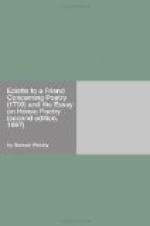Wesley’s resistance to a strict application of authority and the rules grew partly out of the rationalistic and empirical temper of Englishmen in his age, but it also sprang from his learning. From various sources he drew the theory that Greek and Latin were but corrupted forms of ancient Phoenician, and that the degeneracy of Greek and Latin in turn had produced all, or most, of the present European tongues (ibid., p. 354). In addition, he believed that the Greeks had derived some of their thought from older civilizations, and specifically that Plato had received many of his notions from the Jews (ibid., p. 230)—an idea which recalls the argument that Dryden in Religio Laici had employed against the deists. Furthermore, he had, like many of his learned contemporaries, a profound respect for Hebrew culture and the sublimity of the Hebrew scriptures, going so far as to remark in the “Essay on Heroic Poetry” that “most, even of [the heathen poets’] best Fancies and Images, as well as Names, were borrow’d from the Antient Hebrew Poetry and Divinity.” In short, however faulty his particular conclusions, he had arrived at an historical viewpoint, from which it was no longer possible to regard the classical standards—much less the standards of French critics—as having the holy sanction of Nature herself.
Some light is shed on the literary tastes of his period by Wesley’s two essays here reproduced, which with a few exceptions were in accord with the prevailing current. The Life of Our Blessed Lord shows strongly the influence of Cowley’s Davideis. Wesley’s great admiration persisted after the tide had turned away from Cowley; and his liking for the “divine Herbert” and for Crashaw represented the tastes of sober and unfashionable readers. In spite of the fact that he professed unbounded admiration for Homer as the greatest genius in nature, in practise he seemed more inclined to follow the lead of Cowley, Virgil, and Vida. Although there was much in Ariosto that he enjoyed, he preferred Tasso; the irregularities in both, however, he felt bound to deplore. To Spenser’s Faerie Queene he allowed extraordinary merit. If the plan of it was noble, he thought, and the mark of a comprehensive genius, yet the action of the poem seemed confused. Nevertheless, like Prior later, Wesley was inclined to suspend judgment on this point because the poem had been left incomplete. To Spenser’s “thoughts” he paid the




